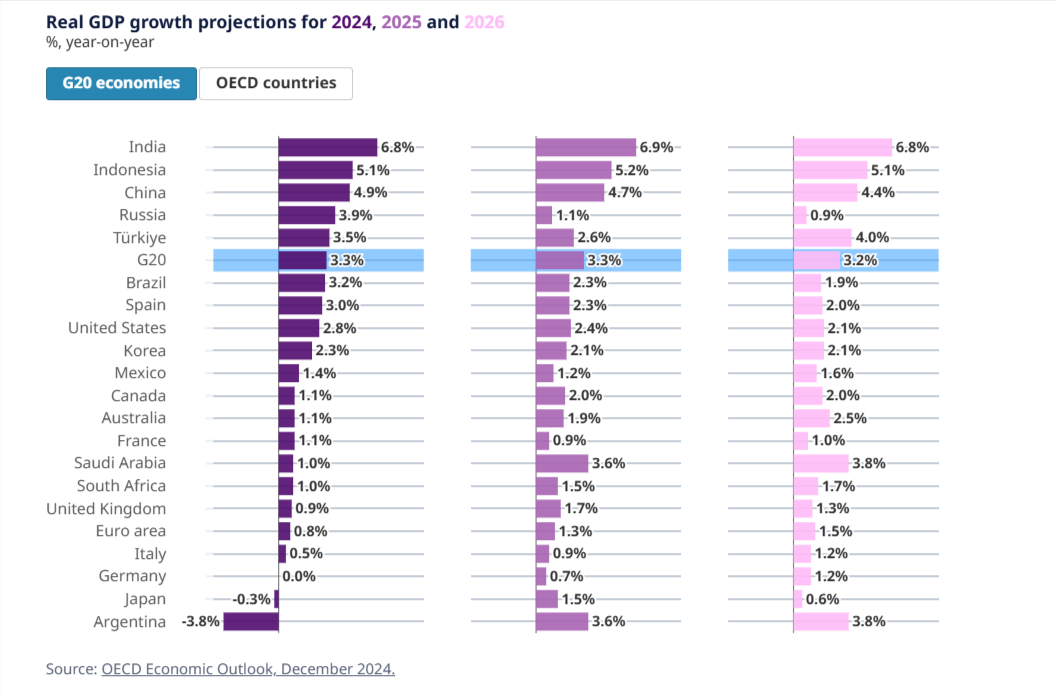According to the OECD's latest Economic Outlook, the global economy will remain resilient despite significant challenges. Global GDP is projected to grow by 3.3% in 2025, up from 3.2% in 2024, and 3.3% in 2026, the report indicated.
The OECD Economic Outlook, Volume 2024 Issue 2 highlights that the global economy has shown resilience despite varying activity levels across countries and sectors.
Inflation has moderated, with headline inflation returning to central bank targets in most economies.
Inflation in the OECD is expected to ease further, from 5.4% in 2024 to 3.8% in 2025 and 3.0% in 2026. This is supported by still restrictive monetary policy in most countries. Headline inflation has already returned to central bank targets in nearly half of advanced economies and 60% of emerging market economies.
However, the report points out that risks remain, including geopolitical tensions, persistent inflation, and potential financial market corrections.
“The global economy has proved resilient. Inflation has declined further towards central bank targets, while growth has remained stable,” OECD Secretary-General Mathias Cormann said.
"Significant challenges remain. Geopolitical tensions pose short-term risks, public debt ratios are high and medium-term growth prospects are too weak.
"Policy action needs to safeguard macroeconomic stability – through monetary policy easing that is carefully calibrated to ensure inflationary pressures are durably contained and through fiscal policy that rebuilds fiscal space to preserve room to meet future spending pressures.
"To boost productivity and the foundations for growth, we must enhance education and skills development efforts, undo overly stringent constraints to business investment and successfully tackle the structural increase in labour shortages."

In OECD countries, GDP growth is expected to be modest at 1.9% in 2025 and 2026. Non-OECD economies are anticipated to maintain stable growth, with emerging Asia continuing to contribute.
Labour market tightness has eased somewhat, but shortages remain high, particularly in healthcare and ICT.
The report calls for decisive policy action to address these shortages, including investments in upskilling and reskilling. It also calls for reforms in education and lifelong learning systems.
Inflation outlook is positive, with consumer price inflation expected to decline further. By 2025 or early 2026, inflation is projected to return to target in almost all major economies. However, the report warns that elevated geopolitical tensions and global trade restrictions could hamper disinflation and weaken the growth outlook.
Overall, the OECD Economic Outlook portrays a picture of resilience but tempers this optimism with significant uncertainties. Key policy priorities include ensuring a continued decline in inflation, establishing a credible fiscal path for debt sustainability, and implementing reforms to boost sustainable and inclusive growth.
“Structural reforms are essential to lay the foundations for stronger, sustainable growth,” OECD Chief Economist Alvaro Pereira said.
“Labour shortages are already a challenge for firms in many countries, and population ageing will only exacerbate this. Policy action needs to ensure that skills evolve with demands on labour markets and that labour force participation, especially of older workers and women, rises.”
For the full report and more information, visit the Economic Outlook online.
